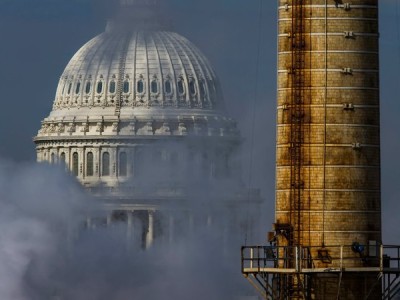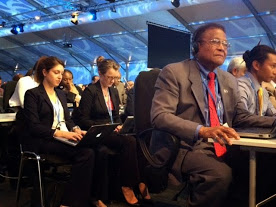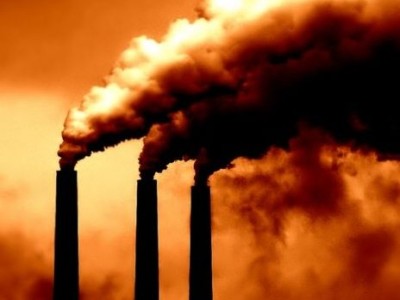Climate Change
Tea Party Support for Cutting Greenhouse Gases?
Surprising New Poll Results
The NY Times reports some very interesting poll results regarding climate change. The poll shows that Americans are more likely to support a candidate who favors action on climate change, less likely to favor a candidate who takes the “I am not a scientist” line, and much less likely to favor one who calls climate …
Continue reading “Tea Party Support for Cutting Greenhouse Gases?”
CONTINUE READINGThe Hottest Year (So Far)
Scientists at NOAA and NASA announced the 2014 was the hottest year since systematic record keeping began in 1880. This is all the more striking because 2014 wasn’t a strong El Nino year, when you expect especially warm global temperatures. If you leave on the East Coast or in the Midwest, you may not have …
Continue reading “The Hottest Year (So Far)”
CONTINUE READINGCan We Control Climate Change and Still Have Economic Growth? (Part II)
It’s all in the timing.
Yesterday’s post discussed economic growth and how it relates in principle to carbon emissions. Basically, economic growth just means that people will be getting goods and services they prefer over today’s goods and service. There’s no intrinsic reason why the “better” bundle necessarily has to involve more carbon. In fact, it could involve a lot less carbon. …
Continue reading “Can We Control Climate Change and Still Have Economic Growth? (Part II)”
CONTINUE READINGLooking Back at COP20: How Should We Feel?
The Lima Accord lets countries name their own price to address climate change. But that doesn’t mean it failed.
As you’ve probably heard by now, this year’s UN climate change conference has produced an agreement, the “Lima Accord.” The Accord invites each of the nearly 200 negotiating countries to develop an “intended nationally determined contribution” (INDC) to reduce its GHG emissions. INDCs represent some step forward from each country–in the words of the Accord, “a progression …
Continue reading “Looking Back at COP20: How Should We Feel?”
CONTINUE READINGCan We Control Climate Change and Still Have Economic Growth? (Part I)
What do we mean by “economic growth”? Does it always mean more carbon?
The Washington Post recently had a column arguing that even climate advocates and scientists are in denial, for thinking that we can have economic growth and still fight climate change. is that true? It’s useful to take some time to think through what we mean by economic growth and how that relates to carbon emissions. …
Continue reading “Can We Control Climate Change and Still Have Economic Growth? (Part I)”
CONTINUE READINGGiving Indigenous Peoples a Voice at COP20
Observations from the Lima UN Climate Conference – by Sarah Kozal
This post is by Sarah Kozal, UCLA School of Law Class of 2016, who participated in the Lima COP last week as part of UCLA’s delegation. One surprise of COP20 has been the large presence of indigenous peoples’ issues and voices. In particular, many of the side events at the conference have focused not only …
Continue reading “Giving Indigenous Peoples a Voice at COP20”
CONTINUE READINGProgress at the UN?
A view from the Lima climate COP
The annual Conference of Parties of the UN Framework Convention on Climate Change opened this week in Lima, Peru, drawing delegates from around the world, including a few from UCLA Law. I am in Lima along with Legal Planet blogger Jesse Lueders and three students from our UCLA Environmental Law Clinic, Sarah Kozal ’16, Jacob …
Continue reading “Progress at the UN?”
CONTINUE READINGOur Air is a Lot Cleaner and Prospects for Climate Action a Lot Brighter Thanks to Citizen Suits
Climate change, ozone and mercury rules all the result of citizen suits
Three sets of Obama Administration’s environmental rules are in the news these days: those on climate change, mercury and ozone. The President is being praised among environmentalists for his ambitious actions and lambasted by some business and Republican leaders for engaging in a “war on coal.” Yet lost among the clamor is one key …
CONTINUE READINGMore Thoughts on the US-China Climate Announcement
Ann Carlson and I talk with the New York Times on US politics, Chinese implementation, and the potential impact on India.
Ann Carlson and I talked with Edward Wong from the New York Times last week about the US-China Climate Announcement. We repost the Q&A here. From Edward Wong, NYT: The biggest commitments to come out of President Obama’s recent visit to China involved climate change policy. The leaders of the two nations stood beside each …
Continue reading “More Thoughts on the US-China Climate Announcement”
CONTINUE READINGSome Unsolicited Advice for Tom Steyer
There were a number of efforts by wealthy individuals and/or Super PACs to affect the midterm election results. Most relevant to this blog, Tom Steyer used tens of millions of his own funds to support candidates that he felt would be more supportive of efforts to address climate change. After the election, the media portrayed …
Continue reading “Some Unsolicited Advice for Tom Steyer”
CONTINUE READING










